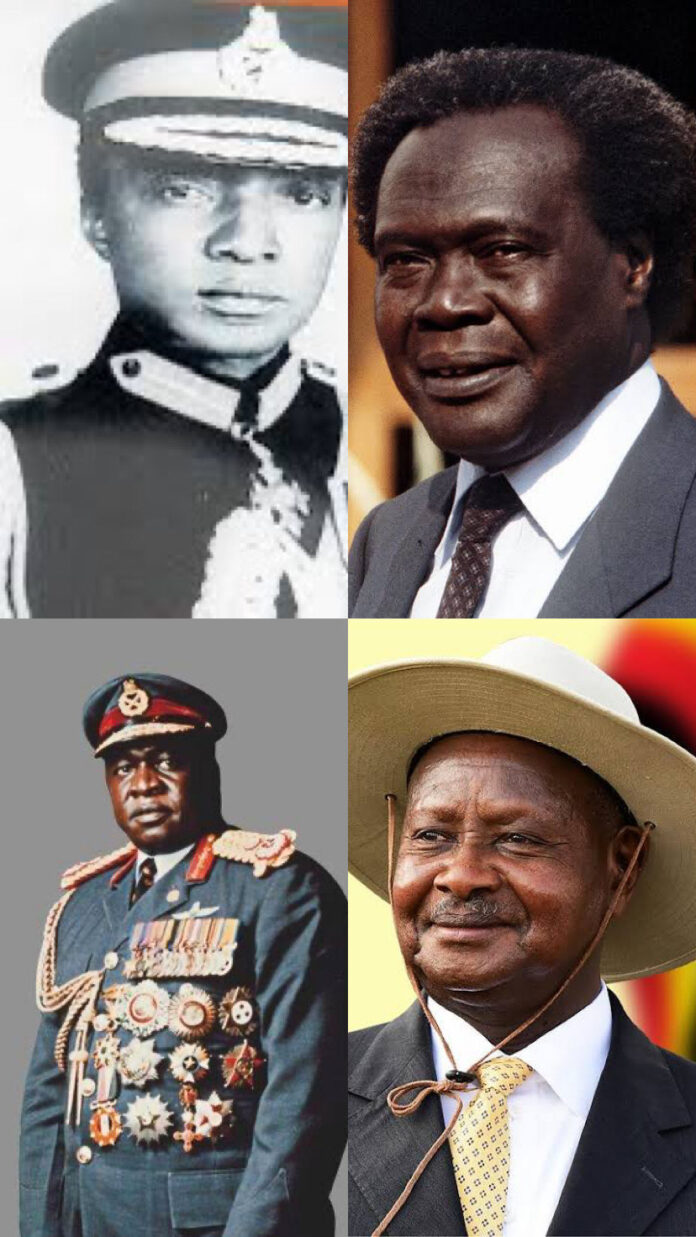When change of power is mentioned in Uganda, what comes to the minds of citizens is the tragic and bloody series of how presidents have overthrown each other since independence.
This raises worries and serious concerns about whether it is the end of the beginning or the beginning of the end of a peaceful transition in Uganda.
Uganda is a small landlocked country that has suffered a horrible and tragic political dilemma where citizens have never seen any peaceful change of power.
Under British colonial rule, Uganda was formed in 1962 as a constitutional monarchy (the UK model) led by Kabaka Sir Edward Mutesa. Shortly after independence, the constitutional monarchy was overthrown by the military, led by Idi Amin, on the orders of the then Prime Minister, Dr. Apollo Milton Obote, and a republic was proclaimed.
As Prof. GW Kanyeihamba quotes in his book Constitutional and Political History of Uganda: From 1894 to Present, 2nd Edition, it was so horrible to the people of Buganda and the entire cultural institution of Uganda as the 1962 independence Constitution was overthrown in favor of the Pigeon Hall Constitution of 1966 and later the 1967 Constitution, where Uganda was declared a republic.
Human flesh was slaughtered by the marauding army, cultural institutions and kingdoms were abolished, kingdom properties were nationalized, and the Kabaka (first president of Uganda) was forced into exile in Britain, where he lived until his death.
Although the dictatorial honey moon of the second president was short-lived by the army, it was martial law that was declared in 1971 under President Idi Amin, who went down in world records as ‘a mad dictator’.
Known for his military fatigues, Amin ushered in a self-formulated domestic and foreign policy that earned him both local, regional, and international recognition for being a tyrant. Such policies included public executions, arbitrary arrests, and high-profile assassinations; for example, the murder of the then chief justice, Benedict Kiwanuka, the murder of the Archbishop of the Church of Uganda, Janan Luwum, and the Kagera War, where he invaded Tanzania, hijacked a French plane carrying Israeli passengers, and chased away people of Indian origin from Uganda.
The ironic tyranny of Amin also chaotically came to an abrupt end in 1979 after the retaliating Tanzanian forces under President Julius Nyerere joined the exiled elites, and Amin was forced into exile, where he died.
This saw the formation of the military council and eventually the return of Apollo Milton Obote in 1980, who faced an internal rebellion from the National Resistance Army (NRA) rebels, who were led by the current president of Uganda, Yoweri Museveni. This weakened his government, which was eventually overthrown in 1985 by the army led by Gen. Tito Okello and Brigadier General Bazilio Okello.
Suddenly, the NRA rebels, under the leadership of President Museveni, had consolidated most parts of the country. The duo led junta was overthrown in 1986, and a new government was ushered in under the leadership of President Museveni, who has been at the helm up to date.
The only peaceful transition that Uganda has ever had in 60 years has been the transition from President Museveni to another democratically elected leader called President Museveni.
On all the various occasions, President Museveni’s election and re-elections have been challenged both on the ballot and in court, but both have always been in his favor. Although there have been reports of electoral irregularities from election observers at some times, courts of law have gone ahead to determine the allegations on the substantiality test.
The internal opposition seems weak in its attempts to challenge the presidency of President Museveni, as the popularity of President Museveni has been on the decline, according to the tallied electoral results. However, the NRM party is busy traversing the country and consolidating the party’s support, whereas the opposition is in bed, sleeping!
Last week, a group of individuals claiming to be in support of the First Son, Gen. Muhoozi Kainerugaba, launched a new political pressure group, which they named the Patriotic League of Uganda (PLU). The formation replaced the MK Movement, which was launched two years ago to promote Gen. Muhoozi’s cause in a bid to prepare him as a possible successor to President Yoweri Kaguta Museveni, who has ruled Uganda for 38 years.
Could this emerge stronger than the sleeping Ugandan opposition? Well, let’s watch the space.
Many strategists, political scientists, scholars, and the international community are still opportunistic about the possibility of a peaceful transition from the presidency of President Museveni to the presidency of a new face. And who could be the new face? It’s a question to be answered by Ugandans!
Also, this is not a mere transition but a successful transition that will not be easily overthrown by evil forces, as easily as eating a Rolex.
Could this be the end of the beginning or the beginning of the end to a peaceful transition in Uganda?















